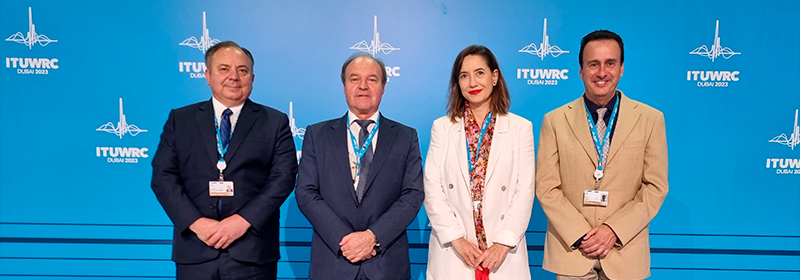- This will constitute an important step enabling the project between ENAIRE and Indra to provide VHF voice and data communication services and surveillance in transoceanic and continental areas
- It will deliver key global coverage to reduce aircraft separation in oceanic and continental zones, optimize routes and reduce CO2 emission levels
- According to González Laguna, CEO of Startical: “This is a key milestone for the viability of Startical’s initiative, as it will provide the frequency band required for this kind of satellite constellation-based solutions”

Startical, the company created by Indra and ENAIRE for the development of a satellite project, will be in a position to use the aeronautical frequency band, whose exploitation from space has been authorized to provide VHF communications services (voice and data) and surveillance for air traffic management. This will constitute a highly important step in the development of the Startical project.
On December 15, 2023, the Plenary Session of the ITU (International Telecommunication Union) World Radiocommunication Conference (WRC-23) approved a new allocation to the AMS(R)S (aeronautical mobile-satellite (R) service) on the VHF aeronautical band (117.975 - 137 MHz). This decision is extremely significant and historic because it will pave the way for new developments and projects while optimizing air traffic control.
This new development will deliver global air traffic management coverage to remote oceanic and continental areas and serve as backup for continental areas with ground station-based surveillance coverage. This globalization will be key to reducing aircraft separation, optimizing aeronautical routes by reducing separation standards and CO2 emission levels and increasing efficiency and capacity, while reinforcing the required level of operational safety.
With this allocation, the Startical project will take a firm step towards the modernization of air traffic control infrastructure in areas without communications and surveillance coverage that use conventional radar systems.
This authorization has been obtained after four years of hard work at the ITU, where Startical (ENAIRE and Indra) has been an important driver and a main contributor to the technical feasibility, compatibility and interoperability studies of this service from space with the current ground services, with the contribution of the services of the Radio Spectrum Planning and Management at Secretariat of State for Telecommunications and Digital Infrastructures to the regulatory procedures and aspects.
In the words of Juan Enrique González Laguna, CEO of Startical, “this is a fundamental milestone that will facilitate Startical’s business model, the result of huge efforts made in record time. It’s a success story that opens the door to further development of the Startical project.”
About STARTICAL
Startical (startical.com) is a public-private initiative project for satellite technology innovation created by ENAIRE (the air navigation service provider in Spain, www.enaire.es) and Indra (leading global technology and consulting company, www.indracompany.com).
The objective of Startical is to create and deploy a network of small satellites at a low altitude to improve air traffic management with a global service vision over the entire planet. Startical seeks to develop and launch into orbit a satellite platform that will expand surveillance and communications coverage with aircraft, especially to extensive oceanic or remote areas without coverage by air navigation systems based on ground infrastructure. Along with its aircraft position monitoring services (ADS-B), Startical will be the first satellite platform for air navigation to include a VHF radio communication system between the controller and the pilot in accordance with aeronautical standards; this is a differentiating factor compared with similar initiatives. These new services will increase flight safety, capacity, efficiency and punctuality, with clear benefits for both airlines and passengers.
About ENAIRE
ENAIRE is the national air navigation agency in Spain.
As a Ministry of Transport and Sustainable Mobility company, it provides en-route control services for all domestic and international flights through its five control centers based in Madrid, Barcelona, Seville and the Gran Canaria and Palma, as well as the approaches to all the airports throughout the country.
In addition, 46 airports receive ENAIRE’s communication, navigation and surveillance services and the maintenance of their air traffic management systems, and 21 airports have their own airbase air traffic control services, including those with the highest volumes of traffic in the country.
ENAIRE is the fourth-largest European air traffic manager and takes part in the A6 Alliance, a coalition for the modernization of the air traffic management system of air navigation providers responsible for over 80% of European air traffic. It is also a member of other international alliances for the promotion of the Single European Sky such as SESAR Joint Undertaking, SESAR Deployment Manager, iTEC, CANSO and ICAO.
ENAIRE, as the agency recognized by the Ministry of Transport and Sustainable Mobility as being in charge of the implementation of the U-space system in Spain, will use its digital platform to provide the common information services (CISP), which are essential for the provision of U-space services to drones and Urban Air Mobility in interaction with the local air traffic services, allowing for the safe co-existence of all types of aircraft.
For the third year in a row, ENAIRE has earned the highest score in the key performance indicator for aviation safety in Europe. It also has the EFQM 500 Seal for its safe, efficient, innovative and sustainable management of air navigation services.
About Indra
Indra (www.indracompany.com) is one of the leading global technology and consulting companies and the technological partner for core business operations of its clients worldwide. It is a world leader in providing proprietary solutions in specific segments of the transport and defence markets and a leading firm in digital transformation and Information Technologies in Spain and Latin America through its affiliate Minsait. Its business model is based on a comprehensive range of proprietary products, with a high-value, end-to-end focus and with a high innovation component. In the 2022 fiscal year, Indra achieved revenue totaling €3.851 billion, with almost 57,000 employees, a local presence in 46 countries and business operations in over 140 countries.